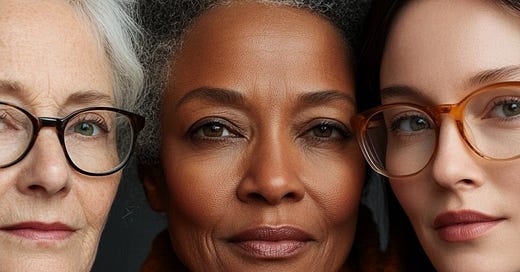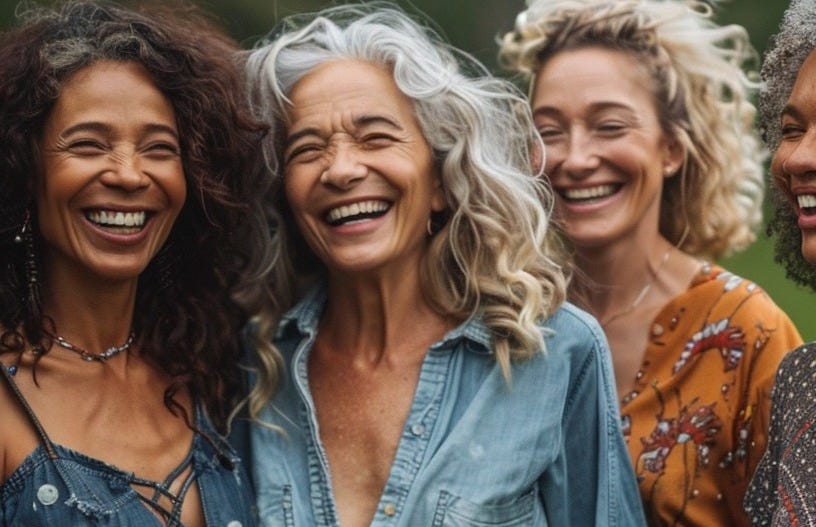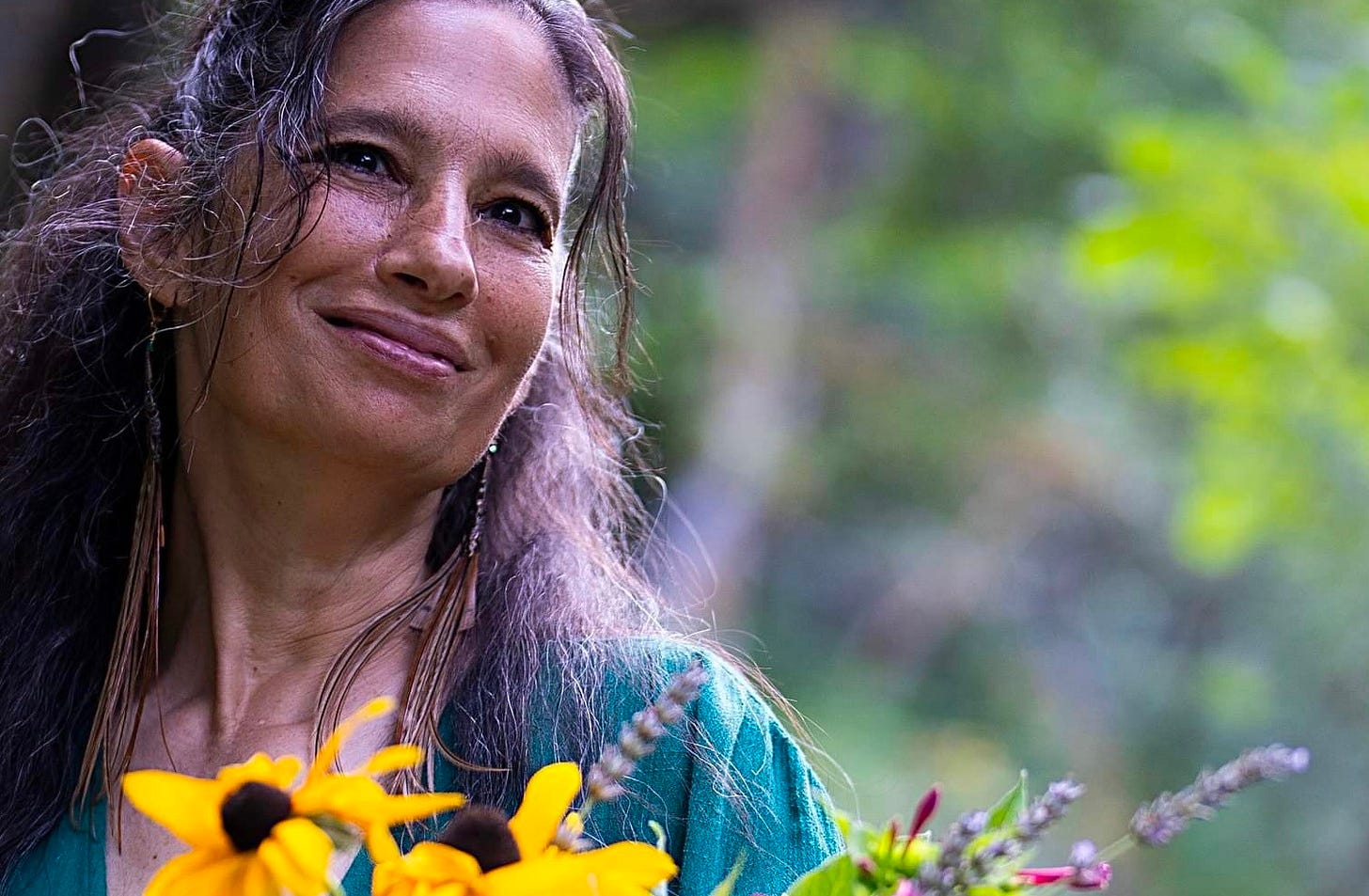When They Call You "Old Hag": The Unexpected Gift of Middle Age
There's something that happens when you cross that invisible threshold into middle age. One moment, you're just living your life—raising children, building career, weathering storms—and the next, someone jokingly calls you "old hag" in the darkness of a ceremony, and something inside you shifts. Not because you're offended, but because you suddenly wonder: what if they're right? What if I am becoming something entirely new?
The Names We Give to Women's Wisdom
Throughout history and across cultures, we've created numerous labels for women as they age. Crone. Hag. Elder. Wise Woman. Matriarch. Some wear the polish of reverence, others the tarnish of fear and dismissal. Yet beneath these disparate terms lies a universal recognition: something powerful emerges in a woman who has lived long enough to see through the veils of societal conditioning.
I've learned that "hag" likely derives from "hagia," meaning holy one, or "hagezussa," the woman who sits at the boundary between the worlds. Not the withered witch of fairy tales, but the medicine woman, the healer who knows which plants will cure and which will kill. The woman whose counsel kings once sought in secret.
Why then do we whisper these names like insults? Why does "you're becoming an old woman" land as criticism rather than celebration?
The Invisible Middle
My mother recently turned 80, and she tells me with unflinching clarity: "When you get older as a woman, you become invisible. It happens quicker with women than men." She describes how doctors speak over her head, how shop assistants overlook her presence, how her opinions—backed by eight decades of lived experience—slide off conversations like water from wax.
I'm not 80 yet. I stand somewhere in that rich, tumultuous territory of middle age—hair streaked with silver, face newly mapped with lines that trace decades of laughter and tears. Not young, not old, but in that powerful liminal space where perspective deepens and vision clarifies.
Yet, already I feel the early symptoms of this social invisibility. The subtle shift in how people receive my words. The assumptions made about my relevance, my desires, my capabilities. The way "middle-aged woman" becomes shorthand for someone whose prime has passed, rather than someone entering her most potent phase.
The Paradox of Middle Age: Never More Invisible, Never More Powerful
Here's the strange alchemy of this middle passage: as the outside world begins to look through you rather than at you, something extraordinary happens within. The energy once spent managing others' perceptions redirects inward, fueling a profound awakening.
I've spent decades as a caretaker of children, relationships, community endeavors, and work projects. Like many women, I wrapped my life around the needs of others, often forgetting to ask: what about me? What about my voice, my needs, my dreams?
The autoimmune issues that emerged in my thirties and continued into my forties weren't just my body attacking itself; they were alarm bells, a biological rebellion against years of putting myself last. The loneliness that sometimes washed over me wasn't just the absence of company but the absence of being truly seen, even by myself.
Yet, in these challenges came gifts. In illness, I discovered what real health means, not just the absence of disease but the presence of vitality. In loneliness, I found the sacred value of solitude. In community breakdown, I learned how to build connections that nourish rather than deplete.
What is your story?
The Reclamation Project
Middle age is when many women begin what I've come to call The Great Reclamation Project. We take inventory of all we've given away—our energy, our time, our personal sovereignty—and methodically, sometimes fiercely, we take it back.
Not in anger (though anger may be a necessary phase) but in the profound recognition that we cannot serve from emptiness. We cannot mother from depletion. We cannot lead from disconnection. We cannot love authentically when we've forgotten how to love ourselves.
This reclamation feels revolutionary in a culture that conditions women to believe their value lies primarily in what they give to others. Revolutionary to say: I matter too. My voice matters. My needs matter. My wisdom—earned through decades of living, failing, succeeding, and surviving—matters profoundly.
The Sovereign Feminine in a Fractured World
We live in extraordinary times. The political has become intensely personal, particularly for women. Our bodies are legislated, our autonomy questioned, and our basic healthcare politicized. The progress my generation took for granted now seems precarious, the rights we assumed permanent revealed as fragile.
What does sovereignty mean in such a landscape? It means standing firmly in your truth when external voices would diminish it. It means recognizing the wisdom of your own body when systems would override it. It means finding your authentic voice when culture would prefer your silence.
The sovereign feminine isn't about domination or power over; it's about power from within. It's about recognizing that true authority emerges not from control but from connection—to self, to earth, to the web of life that sustains us all.
Digital Disconnection in an Analog Body
My generation came of age without screens. We learned about our bodies through direct experience, through conversations with other women, through the practical wisdom passed down (however imperfectly) from mothers to daughters. We had the luxury of discovering ourselves without the distorting lens of social media, without the constant barrage of digital noise.
Today's women navigate a landscape I barely recognize. Where relationships are mediated through devices, where bodies are filtered and Photoshopped into impossible ideals, and where attention is the most precious and exploited resource. My teenage self never had to contend with cyberbullying or comparison to influencers; my young adult self never had her most vulnerable moments potentially recorded and shared without consent.
And yet, despite these profound differences, I see young women today hungry for the same things I was: authenticity, connection, meaning, and purpose. They seek mentors who will speak honestly about the journey. They crave stories that reflect the messy, beautiful truth of living in a female body. They want to know that the path ahead while challenging, leads somewhere worth going.
Carrying the Crown of Years
There's a crown we earn in these middle years. Not the glittering tiara of youth, but something more substantial. A crown weighted with experience, with nights spent pacing floors with sick children, with tears shed over lost loved ones, with the quiet triumph of surviving your own dark nights of the soul.
This crown doesn't announce itself with sparkle; it reveals itself in the steady gaze that meets the world without flinching. In the voice that speaks truth without needing to shout. In the hands that know how to hold space for both grief and joy.
I feel its weight most clearly in moments of collective crisis when younger women turn to me not for answers but for steadiness. For the reassurance that comes from having weathered storms before. For permission to feel deeply without being destroyed by those feelings.
The Earth Rising to Meet Us
As I've moved through these middle years, something profound has happened in my relationship with the natural world. Where once I moved through landscapes admiring their beauty, now I feel myself as inseparable from them. The boundary between "me" and "not-me" grows permeable.
I feel the earth rising to meet my feet when I walk. I sense the air not just entering my lungs but becoming my very cells. I recognize the water in my body as cousin to the oceans, the minerals in my bones as kin to mountains. This isn't poetic metaphor but lived experience—a deepening perception of interconnection that grows more vivid with each passing year.
This embodied wisdom doesn't come from books or studies, though science increasingly confirms what indigenous knowledge has always taught: we are not separate from nature but expressions of it. This knowing comes through the body, through decades of being present in this skin, on this earth.
The Invitation of the Hag
So when someone calls me "old hag" in jest, perhaps I should receive it not as mockery but as recognition. Perhaps they see in me what I'm only beginning to glimpse in myself: the emergence of a woman who stands at the threshold between worlds. Who carries medicine in her words. Who no longer seeks permission to occupy her space or speak her truth.
To be middle-aged at this particular moment in history is to stand at a critical juncture. Behind us lie the patterns that have brought our world to its current precipice; before us are the possibilities for profound transformation.
We who have lived long enough to see clearly but remain vital enough to act decisively have unique contributions to make.
The invitation of the hag—the holy one, the wisdom keeper—is not to retreat into invisibility but to step more fully into sight. Not to speak more softly as the world grows noisier, but to find the authentic voice that cuts through chaos with clarity. Not to surrender our power as culture might prefer, but to embody it more completely than ever before.
To the Women Walking This Path
If you too, find yourself in this rich territory of middle life, know this: you are not fading but emerging. The lines appearing on your face are not marks of diminishment but evidence of a life fully lived. The silver threading through your hair is not loss but illumination. The deepening of your voice, the sureness of your step, the clarity of your boundaries, these are not signs of decline but of ascension.
The world may not have taught you to celebrate these changes. You may have absorbed the message that a woman's value diminishes with age rather than compounds. Unlearning these falsehoods is part of our collective work.
Your sovereign self—the one who knows her own mind, who honors her own body, who speaks her own truth—has been waiting for this moment. The moment when you finally have enough perspective to see through cultural illusions. Enough experience to trust your own knowing. Enough courage to stand firmly in your authentic power.
The crown you now wear was hard-earned. Wear it proudly. The medicine you carry is desperately needed. Offer it boldly. The wisdom growing within you is no small thing. Share it generously.
We need you—not despite your age but because of it. Not despite your complexity but because of it. Not despite the storms you've weathered but precisely because you've learned to dance in the rain.
So when they call you "old hag," perhaps the appropriate response isn't laughter or offense, but a simple, knowing smile. Yes, I am becoming the wise woman. Yes, I am claiming my sovereignty. Yes, I am stepping into the fullness of my power.
And just watch what happens next.
Call to Action: Join The Great Reclamation
Share Your Journey
Dear fellow travelers on this path of reclamation and sovereignty,
This conversation doesn't end with my words—it begins with them. Each of us carries a unique story of becoming, of shedding what no longer serves us, of discovering our power in unexpected moments. I invite you to share your own "old hag" revelation, your own reclamation journey.
When did you first feel the shift? What have you taken back? What wisdom has emerged that surprised even you?
Your story matters—not just to me, but to every woman who needs to know she's not walking this path alone.
Connect With Our Community
Subscribe to The Sovereign Feminine to join a growing circle of women reclaiming their voice, their wisdom, and their rightful place in the world. Each week, we'll explore another facet of the Great Reclamation Project together.
Share this article with the women in your life who might need permission to celebrate rather than mourn their evolving selves. Forward it to the younger women who deserve to know what awaits them is not decline but ascension.
Start the Conversation
Coming soon: Our community chat space where we can weave our stories together. Until then, leave a comment below answering:
"What is one thing you've reclaimed in your journey that has brought you unexpected joy?"
Your voice matters here. Your experience illuminates the path for others. Your wisdom—yes, yours—is medicine this world desperately needs.
Let's wear our crowns together.






